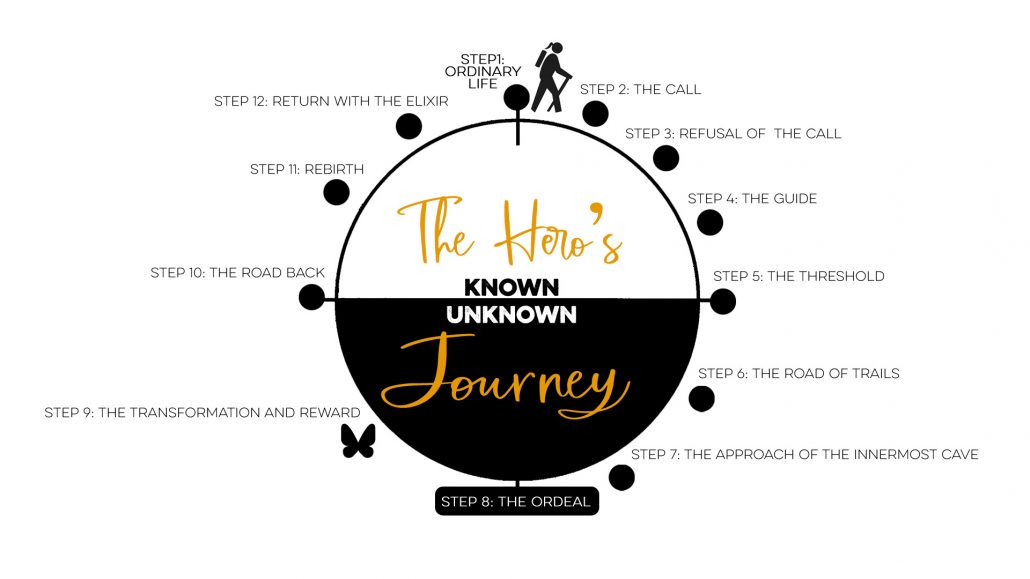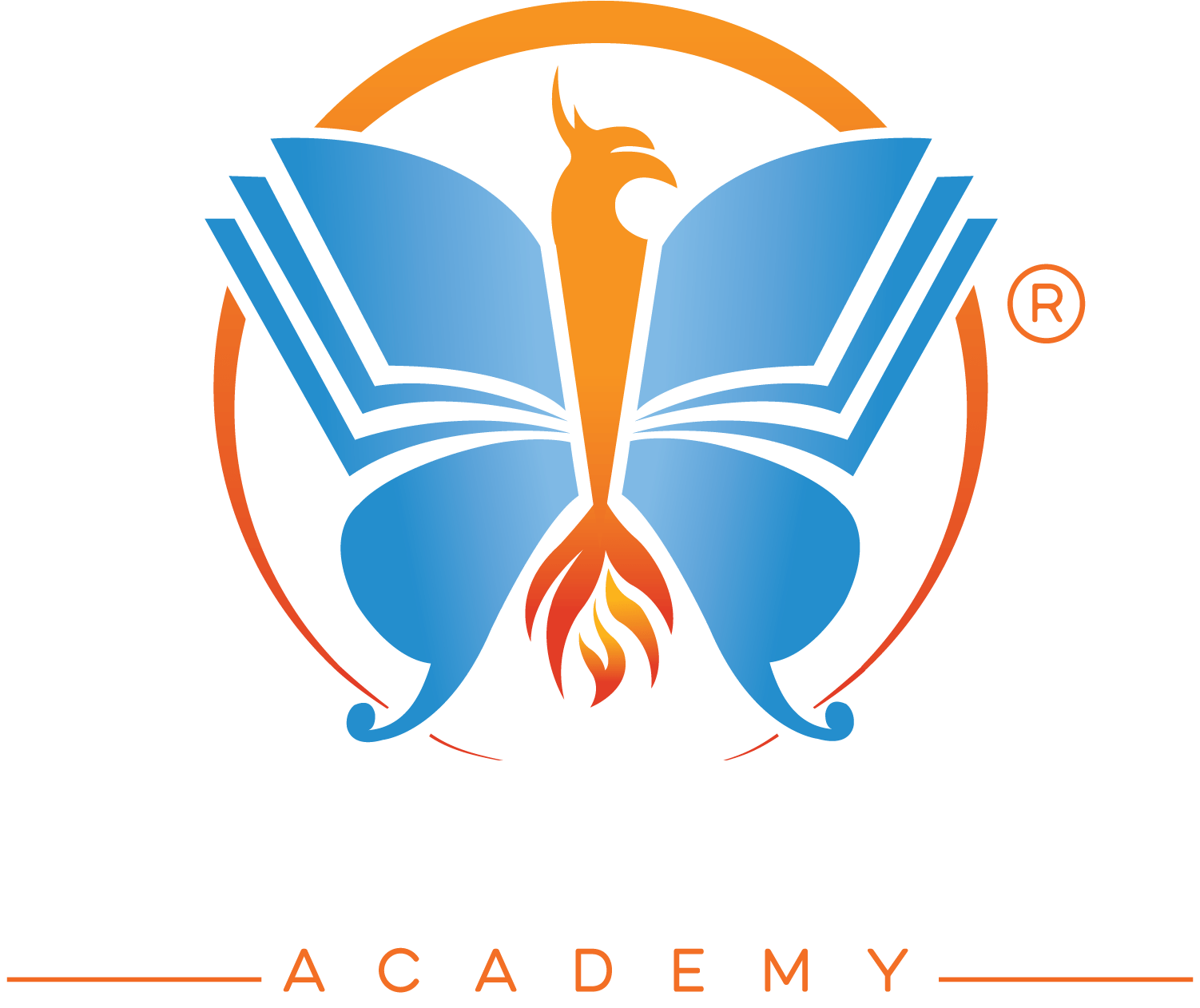
Welcome to Your Hero’s Journey
If you’ve ever watched a move or read a story, you know that at the center of every story is a hero. This hero isn’t usually a superhero who is endowed with super-human powers. In most cases, the hero is an ordinary person who either has to rise to the occasion when life throws them a catastrophe or who has to face their demons in order to create a better life. If you think about it, even the SUPERheroes usually start out as a regular guy or gal. Think the nerdy Clark Kent who becomes Superman or the timid Frodo Baggins who saves the world in the Lord of the Rings.
Not only do most stories follow the tale of a hero’s journey, but that journey tends to follow a similar path. In fact, this same journey narrative has been used over and over again since as long as humans have been telling stories. Joseph Campbell is famous for his work dedicated to exploring why the specific steps in the hero’s journey are so consistent throughout the history of storytelling, as well as the psychology behind why humans are so intrigued with stories.
The 12-steps of the hero’s journey, as solidified by Campbell, are used in movies and literature because it works. The human mind finds a story that follows this process irresistible. We simply cannot turn away from our hero—we want to know what happens to them—we want them to succeed. Stories and mythologies help point to beyond that which humans can understand with rational thought… they point to the source and meaning of life.
Whether the hero embarks on an intentional quest or is propelled into an unintentional journey, it becomes a serendipitous adventure. The stories may be about the slaying of dragons or overcoming overwhelming odds, but the truth is that all hero myths are about transformation of consciousness. The death of the old person and the birth of another (the hero).
The greatest act of courage is taking the journey into yourself. The moral objective of every tale is pushing beyond perceived limits and sacrificing or dedicating oneself to a cause greater than one’s self.
These stories draw us in because we can relate to them. Each of us sees a little part of ourselves in every unsuspecting hero. We relate to their feelings of dissatisfaction, their dream for a better life, the fear they face stepping into the unknown, the frustrations of their struggles, and the glory of victory. We live out the dream we hold in our hearts through the stories we watch on the big screen. When an ordinary person does extraordinary things, it gives us hope. It tells us that maybe, just maybe, we can do it too.
And the truth is, we are each the hero in our own life’s journey. We relate to the 12 steps of the hero’s journey because it IS our journey. The reason humans have connected to this storyline for thousands of years is that it is the human storyline. The hero’s journey is our destiny!
And so, let’s explore the traditional hero’s journey, what each step looks like, and how your own life experience fits into it. The beautiful thing about exploring your own hero’s journey is that you get to become the playwright. You get to write the script. As you go through the activity, write down what experiences you have had in your life that unfolded like that part of the journey. Try to identify where along the journey you are now, and where you’ve been. You find that you have already completed the hero’s journey, maybe even more than once! Or perhaps you’re at a pivotal moment when you’re answering the call, seeking a mentor, or facing a great challenge.
By looking at your own life, and your current situation, through the lens of the hero’s journey, you can see yourself more objectively. You may be able to see what is happening more clearly, including where the story is leading. In the end, the hero always transforms and returns back to the life they knew before a changed person—a better person—better able to make the difference they are meant to make in the world.
The Hero’s Journey ACTIVITY
Now that you can see how powerful storytelling is for the transformation of the human mind and spirit, it’s time to look at the 12 steps of the hero’s journey and how it relates to your own life. There are no right or wrong answers here. Simply reflect on each step and check in with yourself to see what experiences from your own life you can relate to that stage of the journey.
You may have experienced more than one journey in your lifetime. Every time there is a calling—a problem that pulls you to face a challenge or change—the hero (you) is being beckoned to a new adventure. So, you can go through this activity imagining it starting early in your life and addressing the first big challenge you faced, or you can address the most recent challenge—the one you might be experiencing right now. And in the end, your answers to the questions about your experiences within each stage may not fit together chronologically. The story might not unfold like a movie. In fact, it probably won’t. But that’s not the point. The point is that by looking at your life this way, you will be able to see that you, too, are on the path of a hero. You, too, will transform and fulfill your destiny. Trust the journey.
Step1: Ordinary Life
Most of the time, the hero starts out living a normal, every-day life. Everything is familiar, comfortable. They feel uneasy, uncomfortable, dissatisfied. Then, something happens that wakes them up to the fact that something is wrong.
In your life, what were the first stirrings of dissatisfaction or unease? What happened to wake you up to the need for change?
Step 2: The Call
Depending on the hero, the problem could be external—such as a catastrophe happening in the world around them. For others, the problem is internal, such as becoming aware of a deep dissatisfaction with some aspect of life. After being exposed to this information, the hero feels called to do something about it. The hero is challenge to take action and step into the unknown.
In your life, what are you feeling called to do? Remember, this could be a calling that already happened or that is happening now. (This could be many different things: advance your career, pursue a passion, improve your health, change a relationship, start a business, support a cause, etc.)
Step 3: Refusal of the Call
Often, at first the hero fails to answer the call. They are afraid of what it will take. They don’t think they can do it. They think it will be to hard. They feel insecure, inadequate. Their familiar life of comfort calls them to resist this new adventure. They hesitate. But, they become increasingly aware that there are real consequences if they do not act. Something meaningful will be lost.
In your life, what fears or resistance did you experience after becoming aware of the problem that is/was calling you to action? What additional situations or information were you presented with that further helped you see what was at stake? What are/were you going to lose?
Step 4: The Guide
In most stories, the hero meets a guide, a mentor, or a helper that provides vital advice and points them in the right direction. The timing of the appearance of the guide varies, and so if the hero refuses the call, often a helper of some type appears to nudge them into answering the call. Sometimes the guide continues to return to the hero to help them move along their journey, however the guide never “saves” the hero or do anything for them. The hero does not need to be saved. But, at the same time, the hero never does it all alone.
In your life, who have been your guides? You can list all people who have influenced you, including mentors who do not know that you see them as a guide, such as authors of books you read. However, make sure to identify what guidance you have received that SPECIFICALLY relates to this story. Throughout the rest of the steps in the journey, make a note any time a guide (the same guide or new ones) provides additional advice or direction.
Step 5: The Threshold
This is the pivotal moment when the hero official leaves the ordinary world and steps into the journey in a way that they cannot turn back. This is the decision point. This is when the hero begins their quest!
In your life, what decision point have you experienced? (Are you there now?) What IS the threshold—the pivotal moment? Imagine you stepped from your old life into your new life—what would be that actual step? (This could be an internal decision, a public commitment, a phone call, physically going some place, making a purchase, enrolling in something, something symbolic, etc.) Also, what exactly IS your quest, your journey? What would you call it? Give it a name.
Step 6: The Road of Trails
The entire purpose of a quest is for the hero to learn, grow, and, well, become the hero. In order for this to happen, there are inevitably obstacles to overcome, challenges to meet, and tests of strength of will. The hero will learn the rules of this new world. There will be moments of victory and moments of defeat. The hero will meet allies who help them face their foes. This is the action and adventure part of the story that keeps people engaged, wanting to know more. If the hero just went right from the decision to the victory, no one would watch. And it wouldn’t make for a very fulfilling real-life story either. There is always more meaning in the underdog story, right?
In your life, what obstacles or challenges have you faced (or are you facing)? How has your strength of commitment and will been tested? What are the rules of this new world? How are they different from your old life? What victories have you had? In what ways have you failed? Who are your allies? Your enemies?
Step 7: The Approach of the Innermost Cave
This is the turning point, when the hero finally goes all-in. They reach the point when they are 100% certain what must be done. They are ready to accept the risks and the possibility of failure. This second decision point happens when the hero approaches the innermost cave. This next threshold can be something literal, such as having to enter the cave which contains what the hero fears most or the ultimate challenge the hero must face. It can also be entering into the hero’s darkest places, their inner conflict, their demons. The hero prepares to face the one, big thing that they have been putting off. Often the hero rests briefly to reflect on the journey, summons the courage to face the treacherous road that awaits. Tension escalates in anticipation of the ultimate test.
In your life, what is the innermost cave? What is the one, big challenge? What decision must you make? If you find yourself at this point now, this is the perfect time to be reflecting on your journey, which gives you the courage to see how far you’ve come and that your life has been preparing you for this moment. You are ready. How are you feeling? If you were the guide, what would you tell the hero at this moment?
Step 8: The Ordeal
This is the ultimate test. In movies, this part is called the climax—it’s the peak of the action. The hero must face their greatest fear or face their most terrifying foe. One way or another, the hero must face death, whether literal or figurative. The hero uses the skills and experiences they picked up along their journey through the challenges and their innermost cave in order to face this final challenge. It’s the hero’s moment of truth. Everything is put on the line and the hero moves forward knowing nothing will ever be the same. It can’t, this must be done. And looking back, it is obvious that this moment was inevitable.
In your life, what is the “death” you will face? (The fear, the situation, or the foe.) What skills and experiences have you picked up along your journey that will serve you now? What, exactly, must you do? Can you see that your entire life has been leading up to this moment?
Step 9: The Transformation and Reward
The hero defeated the enemy, survived, overcame. But more than anything, the hero transformed, like a butterfly emerging from its cocoon. Out of the ashes of death rises a phoenix of symbolic rebirth. The hero receives a reward in some from, whether it is recognition, power, wisdom, reconciliation, a treasure, but in the end, no matter the price, the true reward is always the glory of personal transformation itself. The real change is internal.
In your life, what will this transformation look like? How will you feel? What will be different? How will you be different? What reward will you enjoy? Why will it all have been worth it?
Step 10: The Road Back
The hero cannot relax and enjoy the thrill of victory for long. The hero feels another call—to return home—to share the spoils of the reward or bring what was learned to those they care about. The journey is not over. With reward in hand and transformation in heart, the hero charts the path back. But the road can be filled with additional risks and dangers. A villain may appear who seeks to steal the reward. Unresolved issues must be dealt with. The hero may face their shadow. These additional roadblocks challenge the hero to internalize what they’ve learned and prove to themselves that they have, in fact, changed for good. It is in this stage of the journey that the quest is won, or lost.
In your life, what does “returning home” represent? How are you going to use what you have learned or accomplished? Who will you help or what will you do with it? At this point, what unresolved issues do you anticipate having to face? What other obstacles do you anticipate will pop-up in response to your transformation? What shadows may be lurking?
Step 11: Rebirth
This is the moment the hero crosses the final threshold—the final test of the hero’s true growth. The hero is tested for the final time—it is their moment to demonstrate their mastery and step into their power. This battle pushes the hero to defeat their limitations and release their old self, once and for all. They return home a hero.
In your life, after transforming, defeating your foes or reaching your goals, what final battle may you need to face? Is there another step in this journey that you need to take in order to fully be able to feel as though you are “home” and able to integrate everything you’ve learned in your life? What would it take to embrace your new self, 100%?
Step 12: Return with the Elixir
When the hero returns to his ordinary world, a changed person, they will have something to share with those back home. This could be a solution to a problem, a new perspective of life, a resource, or some sort of resolution with key players. Sometimes the hero faces doubters or is even punished for the journey. But, in the end, the hero always shares what they’ve learned or acquired with those who they did it all for. That is, after all, what makes them a hero.
In your life, what is the elixir you are bringing back with you from your journey? Who are you going to share it with? How are you going to pay forward what you learned? What difference are you going to make in the world? Will there be any haters or doubters? If so, how can you remind yourself that you didn’t do it for them, you did it because it was your destiny to be the hero of your own life.
Regardless of where you find yourself along your personal adventure, the hero’s journey shows you that you are always exactly where you are supposed to be. All you need to do is take the next step.
And as your journey continues to unfold, remember that it’s not about avoiding problems, it’s about what you learn while overcoming them. It’s not about perfection, it’s about progress. It’s not about becoming famous or popular, it’s about becoming YOU. And it’s not just about you, also about how you use your life experience to make a greater impact.
Journey On…
If you want to dive deeper into your personal narrative and hero’s journey, take the full “Complete Guide to Total Transformation” course and save 70% off, only $10!
OR, become a Transformation Life Coach (70% off) Only $57! Get certified to use all of the processes of the Hero’s Journey with your clients!







